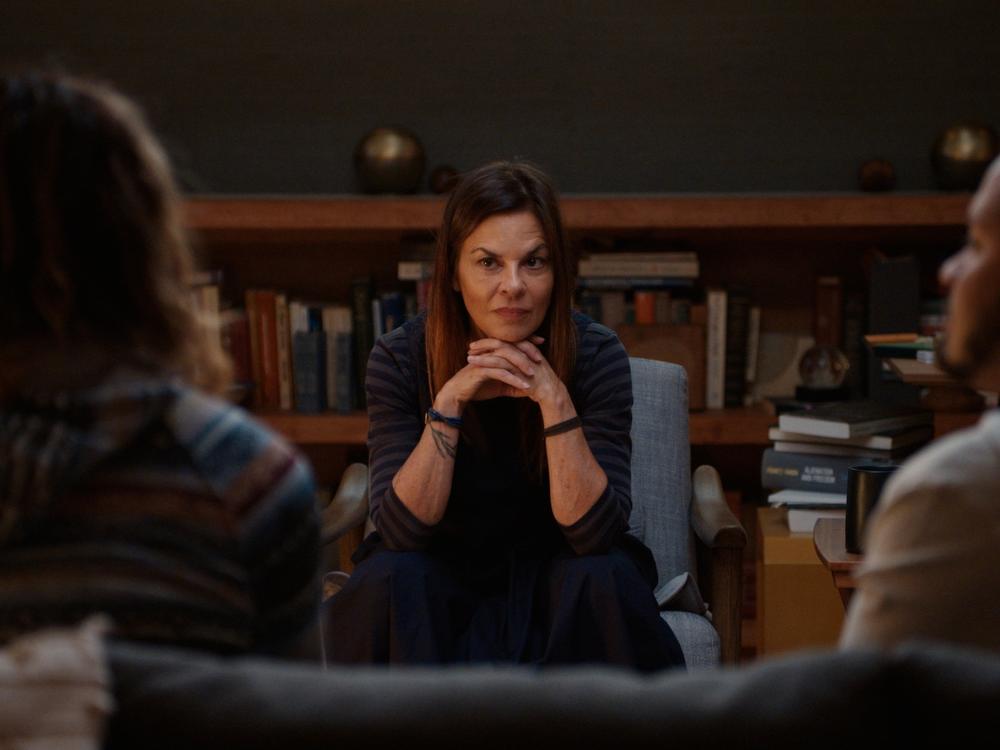Section Branding
Header Content
TV series 'Couples Therapy' gives viewers a rare look into real life therapy sessions
Primary Content
We often think of couples therapy as some last-ditch effort that people make when they're pretty much ready to break up.
One documentary series is challenging that idea by following the experiences of couples who are in therapy at different stages of their relationships.
Couples Therapy gives viewers a rare look into real-life therapy sessions and the deeply intimate conversations that are normally private.
The series is now in its fourth season, and All Things Considered host Ailsa Chang spoke with Orna Guralnik, the psychotherapist at the center of the show, about what it’s like putting such intimate moments on TV.
This interview has been lightly edited for length and clarity.
Ailsa Chang: My first question for you, Orna, as a therapist: why? Like, tell me what excites you, what is compelling for you about making public something that is usually so intensely private.
Orna Guralnik: I know. And the frame of confidentiality is usually sort of our first rule, right? I felt the same way when I first heard about this idea. But what excites me the most about what the show has been able to accomplish is that it manages to offer something to people that otherwise wouldn't have access to therapy, wouldn't have access to how other people work through their issues as relationship issues always emerge. There's a lot of really vital information that I think the series offers.
Chang: How do you think the interactions change because everyone participating knows there is an audience present, a huge audience?
Guralnik: Shockingly, in a fundamental way, nothing changes. There's something essential about the work that doesn't change at all, no matter the cameras. But there is something about knowing that it's being recorded – and that it may be aired – that intensifies the work a lot. It's almost like therapy on steroids. So it happens faster.
Chang: What's new about this season is we encounter the show's first polyamorous relationship, a group of three people. And I was curious watching you working with them: are there universal lessons that we can learn from this group, even though they don't represent a "typical relationship"?
Guralnik: What's interesting to me about working with nontraditional structures is that the ingredients of a relationship don't change. In the case of polycules or people in polyamorous relationships, there's a great deal of emphasis on verbalizing things. On keeping things very explicit.
Chang: I was so struck by how explicit the understandings were – there was almost this contract that they were trying to draft among the three of them.
Guralnik: Well, there's always a contract. In every relationship, there's a contract, whether it's explicit or implicit, or it's passed down from tradition. What happens with nontraditional structures or with polycules is they have to reiterate a new version of the contract. And they're figuring it out as they go because they're not relying on tradition. So they have to be very, very thoughtful and explicit about the new contract.
Chang: A colleague of mine shared that watching your show was instructive for him in his own decision to break up with a longtime boyfriend. And I'm wondering how you feel about your relationship with viewers. These are people who are learning from you and from your clients.
Guralnik: I feel super, super responsible. I think that's been the biggest honor and privilege – and the biggest burden of doing this show. We take that very, very seriously, to make sure we're really pushing [the show] in the direction that we ethically and morally and psychologically believe in. I take it really, really seriously. I mean it's an honor and a very big responsibility.

